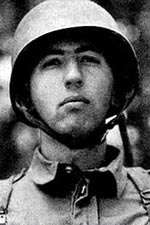Herbert Sobel
| Herbert Sobel | |
|---|---|
 | |
| Born |
January 26, 1912 Chicago, Illinois, U.S. |
| Died |
September 30, 1987 (aged 75) Waukegan, Illinois, U.S. |
| Allegiance |
|
| Service/branch |
|
| Years of service | 1940–47, ca. 1950–53 |
| Rank |
|
| Unit | Easy Company, 2nd Battalion, 506th Parachute Infantry Regiment, 101st Airborne Division |
| Battles/wars | Korean War |
| Awards |
Bronze Star American Campaign Medal European-African-Middle Eastern Campaign Medal World War II Victory Medal[1] |
| Relations |
Michael (son) Herbert Jr. (son) Rick (son) |
| Other work | Accountant |
Herbert M. Sobel Sr. (January 26, 1912 – September 30, 1987)[2] was a commissioned officer with Easy Company, 2nd Battalion, 506th Parachute Infantry Regiment, in the 101st Airborne Division during World War II. Sobel was portrayed in the HBO miniseries Band of Brothers by David Schwimmer.
Early life and education
Sobel was born in Chicago, Illinois, to a Jewish family.[3] He was a clothing salesman after attending military school at the Culver Military Academy in Indiana.[4] He graduated from the University of Illinois.[4] Sobel volunteered for the paratroopers soon after the outbreak of World War II and was commissioned as a second lieutenant.
Career
Promoted to first lieutenant, Sobel commanded Company E for all of their basic training at Camp Toccoa, Georgia. He was known to be petty and vindictive, earning the hatred of many of his men. He also trained his men intensely, and was eventually promoted to the rank of captain in recognition of his ability as a trainer.
After a period of training in the United Kingdom before the Normandy invasion, Captain Sobel was removed from command of Easy Company.[5] Sobel jumped into Normandy and earned a CIB as part of Regimental Headquarters Company. He was later transferred to command the Chilton Foliat jump school.[5] First Lieutenant Thomas Meehan replaced Sobel, and was one of several officers (including Richard Winters) to succeed him in that post before the end of the war.[5]
Shortly before Easy Company took part in the invasion of the Netherlands, Sobel was assigned to the 506th once again, this time replacing Salve Matheson as the regimental S-4 (logistics) officer for Operation Market Garden.[6]
Later life and death
Sobel returned to the United States after the war, and worked as an accountant before being recalled to active duty during the Korean War.[7] He remained in the Army National Guard, eventually retiring at the rank of lieutenant colonel. He later married, and had three children.[8]
In 1970, Sobel shot himself in the head with a small-caliber pistol.[9] The bullet entered his left temple, passed behind his eyes, and exited out the other side of his head. This severed his optic nerves and left him blind.[9] He was later moved to a VA assisted living facility in Waukegan, Illinois. Sobel resided there for his last seventeen years until his death due to malnutrition on September 30, 1987.[9] No services were held for Sobel after his death.[9]
Legacy
Sobel was portrayed as a petty and capricious martinet in the television series Band of Brothers, generating much debate.[10] Stephen Ambrose gives numerous examples of this in his book.[11] Since the series, his son Michael has spoken out on his behalf.[10] In interviews, some Easy Company veterans have acknowledged the part Sobel's training played in the company's later successes. Writing of him in their autobiographies, he is recalled with little fondness by fellow officers, who regarded him as a dilettante in the practical matters of ground combat, particularly due to his pronounced lack of understanding of common infantry field craft such as land navigation and basic infantry combat tactics, as well as a refusal to listen to the advice of fellow officers or NCOs. Enlisted men under his command were unanimous in their dislike of him, and considered him a poor leader who seemed more concerned with his own image than with the welfare of his men.
References
- ↑ DeAngelis, Frank. "Herbert Sobel's shadowbox". Retrieved 2009-10-05.
- ↑ Social Security Death Index record
- ↑ Ambrose 1992, p. 17
- 1 2 Brotherton 2009, p. 241
- 1 2 3 Ambrose 1992, p. 53
- ↑ Ambrose 1992, p. 240
- ↑ Brotherton 2009, p. 242
- ↑ Ambrose 1992, p. 298
- 1 2 3 4 Brotherton 2009, p. 244
- 1 2 Brotherton 2009a, p. 95
- ↑ Ambrose 1992
Bibliography
- Ambrose, Stephen E. (1992). Band of Brothers: Easy Company, 506th Regiment, 101st Airborne from Normandy to Hitler's Eagle's Nest. Simon & Schuster. ISBN 978-0-7434-6411-6.
- Brotherton, Marcus (2009). We Who Are Alive and Remain: Untold Stories from The Band of Brothers. Berkley Caliber. ISBN 0-425-23419-3.
- Compton, Lynn D.; with Brotherton, Marcus (2008). Call of Duty: My Life Before, During, and After the Band of Brothers. Berkley Caliber. ISBN 978-0-425-21970-6.